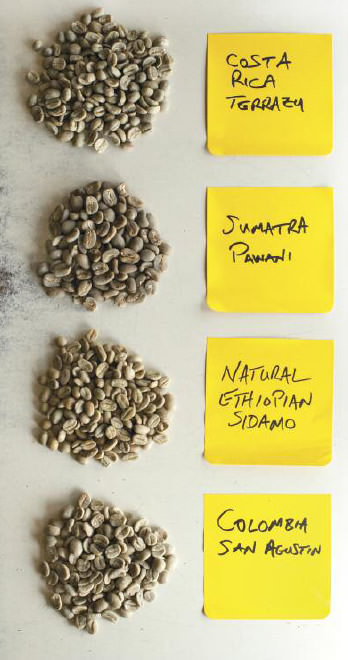drinkable reno tahoe
KNOW YOUR COFFEE
Learn how origins and roasts affect your favorite cup.
WRITTEN BY CHRISTIAN WASKIEWICZ
PHOTOS COURTESY ALPEN SIERRA COFFEE ROASTING CO.
How well do you know your coffee? Do you like single origin or a blend? Are you ready to get to know your favorite cup? Then read on.
Single-origin coffee is identified by the geographical location in which it is grown. All single-origin coffees are titled with the producing country’s name, and they are the ingredients of any and all blends. There are three main regions in the world where specialty coffees are produced: the Americas (Central and South), Asia/Oceana, and Africa. Also included within the title can be a region, designating specific areas of growth; appellation, denoted by specific ecosystems in which the coffee is grown; estate, which is located within an appellation; and any mark, which includes registered trademarks and certifications, further identifying and distinguishing the coffee.
Oftentimes the grade of the coffee is listed in the title, such as Supremo, AA, SHB, etc. And for the aficionados and scientific detail folks, knowledge of the cultivars within the origin can further define a favorite coffee. These all have an effect on ultimate flavor in the cup.
Within the spectrum of single-origin coffees and their differing foundational flavor profiles, Ethiopian and Kenyan (East African) coffees, as an example, generally are of bold and assertive acidity with fruity, floral, and earthy flavors and heavy body.
Sumatran (Asia/Oceana) coffees correspondingly exhibit mild acidity, and woody and earthy flavors with big body.
South American coffees, which include the world’s largest and second-largest specialty coffee producers, Brazil and Colombia, respectively, are classified as milds and are just that — mild in body, and soft in flavor characteristics, such as notes of caramel, cocoa, and muted spice. These are wonderful and friendly coffees, used most often as blenders, but the single-origin designations, such as Colombia Nariño or Brazil Alta Mogiana, are excellent in the cup.
Central American coffees vary the most within the predominant three-world regions because of the longitudes the countries cover, offering a broader difference in soil and climatic effects.
Traditional blends are those known as French, Italian, and Viennese. Although these titles do represent geographical locations, the flavor profile of each of these blends is governed by broadly accepted standards, which also encompass a specific degree of roast, namely on the dark side.
French Roast is known on the West Coast of the U.S. to be the darkest of roasts, which should offer a complex flavor that is sweet and smooth, resulting from the use of mild origin coffees, most often those of the Americas and Asia/Oceana regions.
Italian Roast is primarily recognized here as the darkest of roasts, traditionally used for espresso preparation, offering a deep and intense flavor that is spicy, sweet, and bold, resulting from the use of natural or pulp natural (semi-washed) East African, and Central and South American coffees.
Vienna Roast is smooth and sweet, milder in the cup with less intensity due to its lighter development on the dark roast spectrum.
Most specialty roasting companies offer a signature or house blend, which is guaranteed to be different from anything or anyone else’s blend, regardless of the individual origin coffees used in the recipes. Single origins are roasted on different machines to different degrees and blended together in varying quantities. It is in this action that new flavors of coffee are created, providing the world with greater variety and selection in the cup.
Ultimately, what it brews up to be is what each person’s palate desires and is satisfied by, making coffee drinking a subjectively enjoyable experience.
The skill of the roaster and degree of roast chosen for the single origin, and brewing application of the individual — whether it be at a coffeehouse, drive-through, or your personal kitchen — will play the largest role in the end-result cup.
Christian Waskiewicz is the owner and roastmaster of Alpen Sierra Coffee Roasting Co., a Sierra Nevada region specialty coffee boutique roaster. Waskiewicz has 24 years of experience in the coffee industry and travels frequently to origin countries to assist in appellation development projects and creation of direct-source coffee supply. For details, he can be reached at Christianw@alpensierra.com or visit http://www.Alpensierracoffee.com.


